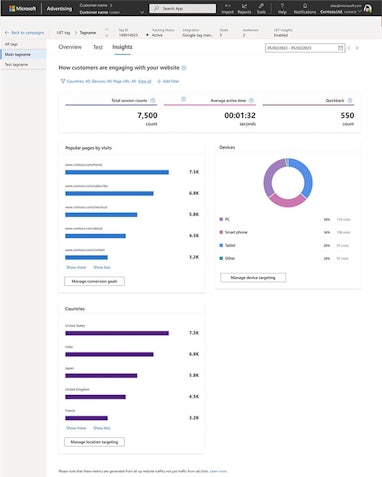Welcome to the latest blog from Impression on Paid Search Industry Updates, where we uncover the latest PPC trends to help you stay ahead of the curve.
Keep reading to discover:
- Google releases a new API version of Google Ads with more features and updates
- Microsoft unveils a new feature called "Insights" for Universal Event Tracking (UET) tags
- Google updates its current Ads Trademarks policy
- Google announces new ways for advertisers to improve its Search campaigns with Digital AI
As usual, traffic light imagery is featured throughout to indicate the importance of each new update – red denoting a priority update, green representing a less important update and amber lying somewhere in the middle.
Google releases a new API version of Google Ads with more features and updates

Following recent changes from Google, a new Google Ads API has also been released with several major updates and features, including new tools to support the migration of Universal Analytics to Google Analytics 4.
Compared to previous versions, this new API version offers users an improved experience of Google Ads interface, enhancing both campaign management and performance.
Here are a few key highlights;
- Account-level negatives: This feature will enable advertisers to gather, create and update negative keywords at account-level, allowing users to not only negate key terms from an ad group or a campaign but a whole account instead.
- New recommendation types: This involves the addition of new recommendation types like ‘Dynamic Image Extension Opt In Recommendation’, where accounts will now benefit from the option of enabling dynamic image extensions. Other recommendation types include ‘Lower Target ROAS Recommendation’ and ‘Raise Target CPA Recommendation’, allowing advertisers to make adjustments to their return on ad spend.
- New conversion action types: This new feature will allow advertisers to identify conversions imported from Google Analytics, and whether, if, it’s a conversion from GA4 or Universal Analytics – this feature is set to become particularly useful given GA4 is going to be replacing Universal Analytics from the 1st of July.
- Offline conversion client summaries: This new feature, located in customer resources will help provide information about the offline conversions process such as, for example, how many conversions were successfully uploaded and how many conversions did not.
- Keyword Planning Space: This will involve a new feature called ‘Generate Forecast Keyword Metrics’ that will help support keyword forecast metrics, forgoing the need to create a keyword plan first.
What does this mean for me?
For advertisers, this new API update will mean better user experience, allowing users to quickly retrieve information from the interface more readily. It will also enable advertisers to effectively and creatively manage their large and/or complex Google Ads accounts and campaigns, vastly increasing the efficiency of account management and performance. The addition of new GA features, will also help advertisers with the transition of UA to GA4, making it easier for advertisers to understand the type of conversion data coming through.
Microsoft unveils a new feature called “Insights” for Universal Event Tracking (UET) tags

Microsoft has recently revealed the introduction of a new feature called ‘UET Insights’. This feature will be automatically activated from 17th July 2023, for all Microsoft advertisers using the UET tag in their campaigns.
Microsoft’s Universal Event Tracking (UET) tag enables advertisers to gain insights into customer behaviour post-display on their advertisements and get better understanding of their audiences. UET tag tool records customer interactions on your website, enabling you to target specific audiences through remarketing lists and track conversion objectives, such as purchases, sign-ups, downloads, calls and more. The UET tag also enhances the performance of automated bidding strategies and ensures better ad performance.
The new feature will enhance the functionality of Microsoft’s tag by sharing essential data about advertisers’ user engagement. The advertisers will get access to a built-in dashboard, which will include the following key metrics:
- Popular pages by visits
- Average active time
- Total session counts
- Quick backs – (visitors who stayed on a website for a short time, similar to bouncers in Google Analytics)
- Session split by country
- Session split by device

Microsoft informed advertisers that UET Insights will not need any coding and the new feature will offer near real-time insights on the UET dashboard, which should be welcomed by users of the Microsoft Advertising platform. The company claims that the UET Insights feature will be well optimised, so will not impact advertisers’ site performance negatively and announced that no sampling will be involved, so the advertisers will maintain full control over the insights. Finally, Microsoft claimed that the insights should support advertisers with more efficient targeting, fraud detection and minimise conversion loss.
What does this mean for me?
This move means that advertisers will get access to comprehensive and representative insights, which in theory should enrich their understanding of users’ behaviour and website performance, resulting in the development of more successful advertising strategies. In the event that an advertiser wishes to discontinue the utilisation of the new feature, he will have a convenient option to deactivate it as needed.
Google updates its current Ads Trademarks policy

Google announced major changes in how the company will process trademark complaints from 24th July 2023. The company will stop accepting and processing trade mark complaints against all advertisers in the trademark owner’s industry. After the new update comes into force, the platform will only accept and handle trademark complaints against specific advertisers and/or ads.
Moreover, Google stated that as part of its transition to a new policy enforcement system, trademark restrictions that were in place before July 24, 2023, will be gradually eliminated for the majority of advertisers within the next 12-18 months.
What does this mean for me?
Prior to the update, ads containing a specific trademark phrase could easily face restrictions even if they were using the phrase in a generic context not related to the trademark if the proper documents were sent to Google by the trademark’s owner.
This often led to Google’s algorithm mistakenly flagging ads that should not have been flagged according to their Trademark policies. Consequently, numerous advertisers across various industries encountered significant challenges.
The update in change should make issue resolutions faster and reduce industry-wide restrictions, which hinder the full use of the platform for many advertisers whose ads have been incorrectly limited due to trademark violations.
Google announces new ways for advertisers to improve its Search campaigns with Digital AI

During this year’s Google Marketing Live event, Google announced new ways for advertisers to improve its Search campaigns with Digital AI. For many years, AI has been sitting quietly in the background, helping advertisers maximise their time and investment. However, given recent developments in AI technology over the last few years, its capability has grown, bringing it front and centre, transforming the digital industry.
One of the announcements that Google shared was that it will be introducing a new conversational experience within Google Ads to help advertisers build better search campaigns. Simply ask Google AI for ideas, just how you would ask a colleague and Google will automatically generate relevant headlines, descriptions and other related assets relevant to your campaign.
As well as this, Google also announced that later this year, it will be supercharging its automatically created assets with generative AI to effectively create and adapt search ads to the context of the query. For example, if a user were to search ‘skin care for dry skin’, AI would use content from the site’s landing page and any pre-existing ads to create new headlines that are more relevant and closely align with the query such as ‘Soothe Your Dry, Sensitive Skin’.
Furthermore, advances in Google AI will also allow for improvements in Smart Bidding, bringing deeper integration into Google’s large bidding models, helping to better understand consumers’ intent and searches. This will soon mean that Smart Bidding will intelligently optimise search queries that have never been seen before, helping to better deliver on performance.
What does it mean for me?
In essence, for advertisers, these integrations into Google Ads will lead to better campaign performance as the use of digital AI will help make more tedious tasks quicker and easier to complete, enabling advertisers to focus efforts elsewhere within the account.
More specifically, the addition of a more conversational experience within Google Ads will help jumpstart campaign creation and simplify the process of Search Ads, making it easier to create campaigns within Search. Whilst using generative AI for automatically created assets will help advertisers to improve their ad relevance, keeping assets fresh – all while staying true to the brand. Meanwhile, improvements in bidding will help increase the chances of advertisers’ search ads being shown in more valuable search moments, capturing new opportunities that wouldn’t have otherwise been able to show if it wasn’t for AI.
Look out for our next blog in August for more paid search industry updates to inspire your PPC strategy. If you want to talk about your business aspirations, get in touch!





